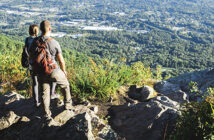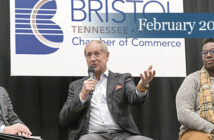 2017 Laureate: Mark J. Costa
2017 Laureate: Mark J. Costa
Mark J. Costa, chairman and CEO of Eastman, rose from working class, if not humble, beginnings. He was born to Alice and Donald Costa and raised in Salinas, California. Donald Costa was a first-generation American, his parents having emigrated from Portugal. An entrepreneur, Donald became successful in agriculture and trucking, eventually giving Mark the opportunity to become the first member of his family to pursue a college education.
While Mark was an adolescent, he developed an affinity for outdoor sports, enjoying everything from water skiing to tennis to mountain biking. But four years before Mark was to graduate high school, Donald began teaching his son the value of real-world hard work.
“By the time I was 14, I would go work in the truck yards and do maintenance every summer,” Costa remembers. “I worked my way into the business office by the time I got to be a senior in high school, but I was always sort of working in that kind of business. Working in the maintenance yard gave me a deep appreciation for hard labor and hard work that people do in this country.”
When Costa arrived at the University of California – Berkeley, he had already planned out his career – or at least he thought he had.
“I was pre-med all the way through college,” Costa says. “I always thought I was going to be a doctor. That was my mission in life, my goal, and so I was always taking a lot of science as much as I could. Somehow, I had the intuition along the way to also be an economics major in addition to doing all of the pre-med work when I finally got to Berkeley, which worked out well for me in the end.”

Costa has been praised as both a coach and a listener.
Things changed dramatically for Costa during his senior year when his father’s business went bankrupt. With the family in a difficult financial situation, med school was no longer an option. Costa went to work to help the family get by. The work ethic his parents had instilled in Mark proved its worth.
“It turned out to be great,” Costa says. “I am glad that I ended up on the path I am, but I think one of the things it taught me is you can’t predict life. Success and failure in life is defined by the choices you make when opportunity or tragedy strike and how you respond to it.”
Costa ultimately ended up going to work for a consulting firm called the Monitor Group. He traveled the country, meeting with clients and growing his own business acumen as he helped them. It was during his time with the Monitor Group that he met the remarkable woman who would become his wife, Gita.

Gita and Mark Costa
“I was the last person to walk on the plane because I was late,” Costa remembers. “I sat down next to her and we started talking. We happened to have a connection that her closest friend at work was dating my roommate from college. As that goes, that allowed us to build a conversation and we ended up dating and ultimately getting married. It was certainly the best decision of all of my decisions in my life. I am incredibly fortunate to have her as a partner in life because she certainly makes me a much better person.
“I didn’t tell her, by the way, that the seat wasn’t my seat on the plane until three months after we started dating, but again, opportunities and choices, right?” Costa smiles. “You know, the seat presented itself. I chose to sit there instead of my assigned seat and that was an excellent decision. So it always shows up: life is choices.”
In addition to giving him the opportunity to meet the love of his life, working for the Monitor Group gave Mark the chance to study a broad range of businesses, learning what worked and what didn’t in a wide variety of circumstances.
“I wouldn’t say it was forethought, where I knew what I was doing, but it positioned me well because it gave me a tremendous business education, to learn a lot about industries, a lot about different companies, and different leadership styles by seeing so many different firms,” Costa says, “and that ultimately led me to Eastman.”

The Costa family: Gita and Mark with sons Grayson and Parker
Eastman had a corporate culture that was unique among his clients, Costa says. “Most corporations are consumed with unproductive politics inside the company where everyone is trying to advance their own career often at the expense of someone else’s career, or just not collaborating in the ways that they could, over their own insecurities or aspirations; however you want to frame it. What is so unique about Eastman was, that is just not true; in fact it was the opposite. If you ever behave in a way that you are trying to advance your own career here, no one will work with you, you are done. You don’t have a future at Eastman anymore. So, you have to actually behave as a team in order to be part of a team. So many companies just don’t have that.”
Because of that, Costa says, he knew if he and the leadership team could come up with a great plan to grow the company, Eastman’s people would be able to execute it.
“It wasn’t the strategy. It wasn’t the assets or the technologies or the markets that we were in. It was, ‘I actually think this group of people can do things that are extraordinary and I want to be part of that.’”
Eastman Executive Vice President and Chief Commercial Officer Brad Lich remembers the day he heard Costa was joining the company in 2006. Lich says the first thing he did was place a call to a friend at the Monitor Group who knew Costa.
“I heard a lot of positives, and as you might expect, a few things he could improve upon,” Lich remembers. “But the one thing that came out through and through in that conversation was that Mark was somebody who was intolerant of politics and intolerant of personal agendas. I can say that after working for him for the last 10 years that if I got the same phone call, they would hear a very similar description. I think the only way a leader delivers that kind of consistency in their behaviors is by being very rooted in a set of principles. For Mark that is very much about serving the stakeholders.”
Senior Vice President and Chief Human Resources Officer Perry Stuckey agrees. “Mark knows that shareholders matter. He knows employees matter as much as the shareholders. He also knows that driving and helping customers succeed is very important.”
“Mark is a leader who is focused 100 percent on delivering superior outcomes for our stakeholders,” Lich says. “So for our employees, our customers, our investors, this community, and the communities that our people work in and around the globe, he enters every discussion with a single purpose: how do we get to the right outcome for our stakeholders? He checks his ego and his title at the door and he expects everybody else to do the same.”
The notion of a CEO who checks his ego at the door surprises some, but it fits perfectly when one considers Costa came to Eastman because he already had confidence in the excellence of the people who work there.
Senior Vice President, Chief Legal and Sustainability Officer, and Corporate Secretary David Golden remembers one incident that cemented in his mind the fact that Costa was about doing what was best for the company, regardless of ego. “He and I had been working on a particular issue and I was having a one-on-one with him, and at the end, I felt impressed to offer a little bit of coaching. So I said, ‘Mark, do you mind if I offer you a little bit of coaching?’ He immediately turned to me and was locked in and focused, like it was Christmas morning or something. I offered some coaching and he said, ‘That’s a frame I’ve never thought about before. Do you have more time to talk?’ For the next 30 minutes, we kicked around what I said and looked at it from different angles. Afterward he looped back and said, ‘I really appreciate you taking the time and giving coaching.’ He was extremely sincere about it.”
Senior Vice President, Chief Manufacturing, Supply Chain and Engineering Officer Mark Cox says that in addition to taking coaching, Costa has the ability to coach as well. “In order to coach well, you have to know the folks you’re coaching,” Cox says. “That includes coming alongside them – your ability to work alongside them to understand how they work. In my case, the areas I’m responsible for within the company include manufacturing and engineering. Although Mark may not be a deep expert in those technical subjects, he is an expert in thinking – an excellent thought partner who is always willing to come sit beside me and take the time to help me think through an issue.”
Remembers Senior Vice President and Chief Technology Officer Stephen Crawford, “One of our specialists ended up riding the elevator down with Mark, and Mark walked with her all the way down to her car. The entire conversation was not what she expected. She had expected more of a CEO coaching experience, but it wasn’t. It was more of him questioning her, looking for advice, and listening to the things she had learned in the past as she has driven change-management opportunities. After Mark left her she called me to say, ‘Wow, that was a great opportunity to interface with the CEO. He was so engaging and so much of a leader.’”
Costa says being surrounded by great people gives him both the confidence and the humility to take that approach to leadership. “If you are not constantly learning, if you are not constantly seeking feedback and advice from people to improve the quality of your own decisions, the odds of you making great decisions is low. There are a lot of CEOs out there who, once they get the job, think they either have to have all the answers to be the CEO or they get so arrogant that they think they know all the answers – which are really the frightening ones. It’s impossible. So, the other part of long term success in life is humility.”
Though Costa chooses humility, it’s not just his colleagues who are eager to sing his praises. John Tickle, Chairman of the Board of Strongwell and himself a Junior Achievement Business Hall of Fame laureate, has worked with Eastman executives dating back to the days before the company spun off from Kodak, both as a supplier and purchaser. He’s become both a business partner and a friend to Costa.
“Running a company like Eastman that does business all over the world takes somebody that’s full of energy,” Tickle says. “Not only for the job at Eastman, but for all the extra things you have to do being the chairman of a fortune 500 company. It’s a 24-hour, seven-day-a-week job, and Mark has that energy. He gives you energy just to be around him. So he’s the type of person Eastman, or any Fortune 500 company needs to run a company this size. I think he has unlimited possibilities with Eastman.”
Today, Costa needs that energy, as he and Gita are raising two sons, Grayson and Parker, both of whom take after their father as outdoor sports enthusiasts.
“My oldest is 15 and my youngest is 12-and-a-half. They love the outdoors like dad, which is good. We do a lot of mountain biking together, and skiing, and other activities so that makes it a lot of fun. They are also into sports but their chosen sport is lacrosse over football. It seems to be slightly less damaging to the brain but is still a good all-American contact sport, so perfect balance. They are fantastic. Oddly, both are really interested in science like dad so we will see where that goes.”
The advice Costa gives his sons is the same he says he would give to every JA student. “Focus on doing whatever is in front of you as well as you possibly can do. Make sure whatever it is you have chosen to focus on, you have a passion for, that you enjoy. Don’t go do something in life just because you think you should do it, because you will never succeed if you don’t love what you do or at least like it.
“Always seek out as much feedback about how you could be better and more successful in your life from people you respect. Listen in the moment even if it is what you don’t want to hear. Don’t get defensive because if they are (criticizing you); they are not trying to be mean. They are actually trying to help you. And if they are telling you that – and it is someone you respect – they mean it. So, dismissing it is probably not a good idea because there is to some degree some truth in it. (Accepting what you do not want to hear) is the hardest part about self-development for people.
“Recognize you don’t have a lot of control over what opportunity presents itself in your life. You can’t plan out every step of the way for the next 20 years,” Costa concludes. “It is about how to make decisions in the moment and how you make choices that will dictate that outcome. Then just focus on doing everything well.”


David Golden
2017 Laureate: Eastman – Corporate Citizen
The list of past laureates in the Junior Achievement Business Hall of Fame is dotted with leaders from the first 97 years of Eastman. James C. White was a member of the inaugural class of laureates. He would be joined by Perley Wilcox, Toy F. Reid, Earnie Deavenport, Brian Ferguson and Jim Rogers. These individuals were recognized for both commercial and civic ventures. Bearing those criteria in mind, 2017 marks the first induction of a corporate citizen into the Hall of Fame: Eastman.
The company came to the region in 1920, as the Tennessee Eastman Corporation, its sole customer being Eastman Kodak, which sought American sources for methanol and acetates. Perley Wilcox purchased the site of the first Eastman buildings for a reported $205,000.
During World War II, the United States government was so impressed by Eastman’s people it contracted with the company to run the Y-12 electromechanical plant at Oak Ridge. The company oversaw production of Uranium-235 for the first atomic bombs, utilizing a workforce of almost 25,000. The U. S. government also hired Eastman to build what was then known as Holston Ordnance Works to manufacture explosives for the war effort.
Eastman’s people showed their mettle in those days, maintaining total secrecy at Oak Ridge and manufacturing high explosives in Kingsport with no accidents involving loss of life, though virtually none of the employees had experience with such substances.
As the years have passed, Eastman has grown, and in so doing, has become the region’s leading corporate citizen, recognized by leaders throughout the region, from the private and public sectors.
John Tickle, Chairman of the Board of Strongwell in Bristol, Virginia says, “Eastman goes well beyond Kingsport. It serves this whole area. It’s amazing what I’ve noticed – the integrity that Eastman teammates have and how much they give back to the community. Not only Eastman, but Eastman supports its leaders in giving back to the community. It would be a sad, sad state of affairs if we didn’t have Eastman in this area, so we’re very fortunate.”
Dr. Brian Noland, president of East Tennessee State University in Johnson City agrees. “They are not only one of the pillars of this region, but of the state of Tennessee as a whole, both from a philanthropic perspective, from an economic and community development perspective, a social engagement perspective, we would not be who we are as a region were it not for Eastman.”

From fresh-faced interns …

… to experienced employees, what makes Eastman unique is its people.
That the company cares for the people of the region is evident in its generosity, says Brenda White Wright. “The Toy F. Reid Eastman Employee Center not only provides a wonderful facility for our Symphony of the Mountains, but also for our high schools, our social service organizations and all kinds of programs. It is a Class A facility and we are so grateful they open it up to the community for us to use.”
And that generosity is part of the corporate culture of Eastman, adds Kingsport Chamber CEO Miles Burdine. “If there is a problem in this community, we are going to call Eastman. We are going to ask them to help us with it. It doesn’t necessarily mean that they have to give dollars toward solving that problem. Usually it is just their people, their knowledge, their experience, their expertise, their caring heart is what usually helps solve community problems.”
That mindset goes beyond the boundaries of Kingsport throughout the region, says Bill Greene, chairman of Bank of Tennessee. “We are one region. Eastman is helping us become the center of that region to take on the world. There’s no way these individual communities, counties and cities could take the world on. All of us together certainly have a shot at it. Eastman knows that and is working hard to accomplish that, which helps all of us.”
There is no doubt Kingsport and the region have benefitted greatly from Eastman’s presence, says City Manager and model city native Jeff Fleming. “I think historically Eastman has been a very paternalistic company in terms of taking care of its employees, taking care of its community and in a global environment where you must change and make those changes very quickly to adapt to ever changing forces of the economy, you have to ask those level of questions. You have to understand what’s on the horizon and how quickly you have to change to match that. I think a lot of times locally we think that everything revolves around Wilcox Drive when in fact it revolves around Wall Street and they have to adapt quickly.”
Fleming’s point is well taken. The company cannot continue to be a leading corporate citizen unless it stays ahead of a changing world marketplace. Happily, says Kingsport Mayor John Clark, Eastman’s focus on the future is as easy to see as its new corporate headquarters.
“They could have easily gone with bricks and mortar, which is what the rest of the manufacturing center looks like, but the reality of it is they went with a totally different look, sending a signal to their industry, their shareholders, their customers, our community, that Eastman is different now. So I think one of the great things about Eastman is its ability to evolve over time and change along with the market, to continue to take on leadership positions in that particular industry that is highly competitive and not just here domestically but also abroad as well.”
That forward-looking approach led Eastman to begin a major change in corporate strategy in 2012, shedding portions of the business in order to become a truly innovation-based specialty chemical company.
“From 2012 through 2014, we did about $9 billion of acquisitions as well as grew the organic portfolio and really changed who Eastman was,” says Chairman and CEO Mark J. Costa. “So, when you think about our entity value back in 2010-11, we were about $7 billion in market cap plus debt. Today we are about $18 billion so almost triple the size of the company in a period of five years.
“I think that if you look at America today and Eastman as an example of America, what has made America great is innovation. Innovation in business, innovation in products, innovation in services – we lead the world like we have for decades in developing the best products that are offered to the world.
The challenge of innovation, Costa says, is that it requires great people capable of creating brilliant ideas, then turning those ideas into market-altering products. “At the end of the day, you know what’s going to separate Apple versus its competitors, or Eastman versus its competitors, is the people. It is not the assets and technology or the markets that you are in. It is what people do with all of that. So you have to build a culture and a capability across your organization that can be better than its competitors.”
So while much has changed over 97 years, one constant remains. Eastman’s people are still showing their mettle.
“I have watched Eastman over the years,” Burdine says, “and I have learned so much from not just the company but the people that work there. I mean their ethics, their sustainability, how they treat their veterans, how they treat their people, diversity, all those things, all of those words that we use on a daily basis and in chamber world, they are right there at Eastman on a daily basis, and they are at the forefronts of all of them.
Says Senior Vice President, Chief Legal and Sustainability Officer, and Corporate Secretary David Golden, “Before coming to Eastman I was a lawyer in a law firm and worked with a number of companies. One thing that differentiated Eastman was the people. It was the honesty and sincerity, the focus on wanting to do what they need to do, heightened responsibility, a high-end trust, and just good people to work with.”
Eastman’s reputation as a corporate citizen is known worldwide, says Tickle. “Eastman is a green company. They’ve received a Top 50 places to work award in 2014, 2015 and 2016, so that says a lot about a company. They’ve been voted one of the most ethical places to work several times. They’ve won Energy Star Awards in 2014, 2015, 2016 and 2017. They do everything right… I like to do business with not only companies that have high integrity, but people that have high integrity. I’ve noticed that their management teams throughout the years have been easy to work with. They are very accommodating. They want to help. So it’s a company you want to do business with.”
Adds Greene, “I’ve recruited all over the world. I’ve been very lucky. I’ve been to China, Japan, South Korea. If I had my choice, picking an industry I would want for this region from anywhere in the world, after watching them for 70 years and visiting other countries, other leaders in major industries including the chemical industry, I would recruit Eastman.”
George Eastman once said, “Embrace light. Admire it. Love it. But above all, know it.” Today, almost a century after the company came to this region, the light that shines from Eastman emanates from its people.
The first Corporate Citizen to become a Junior Achievement Business Hall of Fame laureate: the people who are Eastman.




